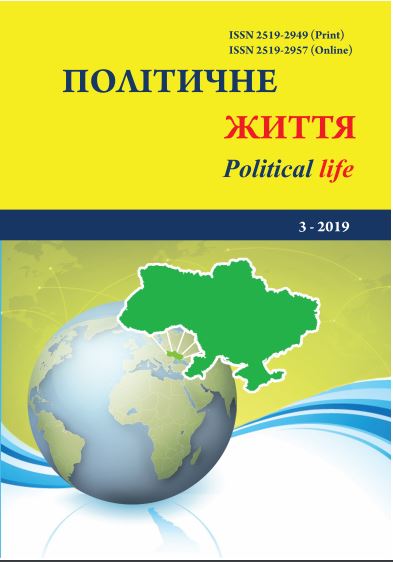Conversion strategies of the power and the political opposition in Hungary in the 1990s.
DOI:
https://doi.org/10.31558/2519-2949.2019.3.3Keywords:
Hungary, power, political opposition, democracy, theory of conversion of public capitalAbstract
The paper clarifies the specificity of the interrelationship between the power and the political opposition in Hungary in the context of the theory of conversion of public capital. Particular attention has been paid to the power reloading stage, which logically should have led to systemic changes and deepening of modernization processes.
The qualitative features, rates, and results of the modernization of Hungarian political system were mainly determined by how effectively political parties used the competitive conditions in order to accumulate and convert various forms of capital at the beginning of the transformation period. Even at the stage of the first democratic elections, they were able to quickly fill up the vacuum existing in the political field, and the chosen strategies were successful both for them and for the democratization of the political regime.
Rational motives, based on access to power resources, are at the heart of the interaction between government and political opposition in Hungary. The choice of either a confrontational or cooperative engagement strategy depended on the parties’ estimated transaction costs. Limitation of democratic rights and freedoms as a result of the political activity of the pro-government parties became a barrier to healthy competition in which the opposition was primarily interested.
The example of Hungary demonstrates that simulation modernization, democratization, and accelerated Europeanization trigger the political significance of the «gap» as a resource for the accumulation of political capital by pro-government parties and the creation of their own network of clientelist relations. Consequently, the country falls into an institutional trap which results in the crisis of democracy. The combination of parliamentary and non-parliamentary opposition gives us a possibility to conceptualize the «deficit of democracy» in election programs, and to «correct» the mistakes of the previous government after coming to power. That is why the alternation of parties in power ultimately leads to the consolidation of democracy.
References
Бусленко В. Ліві партії–наступниці в країнах Вишеградської групи: репозиціонування в умовах політичної конкуренції. Вісник Національного технічного університету України «Київський політехнічний інститут». Політологія. Соціологія. Право. Київ, 2014. № 2 (22). С. 111–116.
Лесечко М., Сидорчук О. Соціальний капітал: теорія і практика : монографія. Львів: ЛРІДУ НАДУ, 2010. 220 с.
Плотинский Ю. Теоретические и эмпирические модели социальных процес сов : уч. пособие. Москва: Логос, 1998. 280 с.
Ágh A. The triple crisis in Hungary: The «Backsliding» of Hungarian Democracy after Twenty Years. Romanian Journal of Political Science. Vol. 13, No. 1. 2013. Summer. P. 25–51.
Grabbe H., Hughes K. Enlarging the EU eastwards. London: Royal Institute of International Affairs, 1998. 130 p.
Hungarian Central Statistical Office. URL: https://www.theglobaleconomy.com/ hungary/unemployment_rate_monthly/ (дата звернення: 06.08.2019).
Hungary Country Report. 2003 / BTI. URL: https://www.bti-project.org/ fileadmin/files/BTI/Downloads/Reports/2003/pdf/BTI_2003_ Hungary.pdf (дата звернення: 06.08.2019).
Hungary Government budget deficit. URL: https://countryeconomy.com/deficit/ hungary?year=2004 (дата звернення: 06.08.2019).
Hungary: youth unemployment. / The World Bank. URL: https://www.theglobal economy.com (дата звернення: 06.08.2019).
Melo M., Denizer C., Gelb A. Patterns of Transition from Plan to Market. The World Bank Economic Review. 1996. Vol. 10, No. 3. P. 397–424. URL: http://www.urbanlab.org/ articles/China/reform%20era/de%20Melo%20et% 20al%201996%20-%20transition%20from%20 plan%20to%20market.pdf (дата звернення: 06.08.2019).
Münch R. Politische Macht als Medium der Kommunikation / Dynamik der Kommunikationsgesellschaft Suhrkamp. Frankfurt am Main: Suhrkamp, 2014. P. 168–184.
Popper K. The Open Society and its Enemies Revisited. Economist. 1988. April. P. 20–38.
Raiser M., Haerpfer C., Nowotny T., Wallace C. Social capital in transition: a first look at the evidence / European Bank for Reconstruction and Development. Working Paper. 2001. No. 61. 30 p.
World Values Survey. 1990. URL: http://www.worldvaluessurvey.org (дата звернення: 06.08.2019).
World Values Survey. 1995. URL: http://www.worldvaluessurvey.org/ WVSDocumentationWV3.jsp (дата звернення: 06.08.2019).

